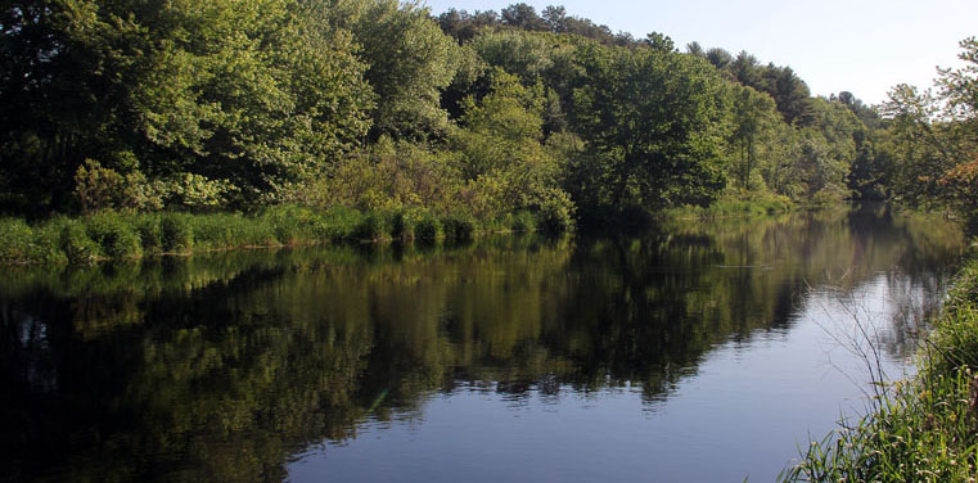
Map Gallery – Click on any image to enlarge
- Pawcatuck Sole Source Aquifer
- Charlestown Ground Water
- Coastal Ponds Watershed
- Proposed Well Location

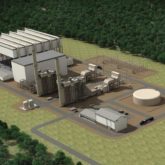
The EFSB’s denial of the power plant is certainly a victory for Burrillville, the Conservation Law Foundation, the Rhode Island Chapter of The Nature Conservancy and others, but it is a victory for Charlestown too. The threat the power plant posed to our drinking water, roads, wetlands and other natural resources is now over and the opportunity to protect the wildlife corridor that connects the two towns is still a possibility.
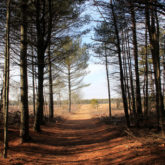
Now that the Narragansett Tribe and Invenergy have terminated their contract to truck water from Tribal land in Charlestown to Burrillville to cool the turbines of Invenergy’s proposed power plant in the forest of that town, Charlestown has lost its intervenor status. That is great news for the wetlands of the Indian Cedar Swamp and for anyone who lives or travels in the path of the proposed tanker truck caravan. Yet despite escaping this threat to our local roads and wetlands, Charlestown remains connected to the forests of Burrillville in several important ways.
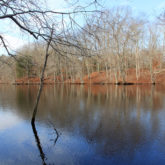
Invenergy writes to EFSB: “the Water Supply Agreement between the Narragansett Indian Tribe and Clear River Energy LLC, executed on September 19, 2017, has been terminated and is null and void”
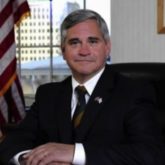
Citing several concerns, Attorney General Peter F. Kilmartin today announced his opposition to the construction of the Invenergy power plant in Burrillville and his intention to seek permission from the Court to file an amicus brief in Rhode Island Superior Court challenging the plant’s water-supply plan.

Invenergy’s application calls for water to be withdrawn from the Wood-Pawcatuck Watershed—a watershed designated by the Environmental Protection Agency as the ONLY source of our drinking water. This water would be withdrawn year after year over the lifespan of the power plant.
This is alarming because sea level rise and warming temperatures will affect Charlestown in particular during this time period because of our geology. This plan will impact our ability, and that of other coastal communities within this watershed as well, to manage these effects.

The applicant’s actions undermine the open, deliberative process required for public confidence in government decision-making. Please reject this proposed supplemental water supply plan because it is vague, ambiguous, misleading, unnecessary, environmentally detrimental and a risk to the public health, safety and welfare.

I am concerned about the complete lack of transparency regarding the contract between Invenergy and the Narragansett Indian tribe for water as well as the weak merits of the overall plant proposal.
The siting board should decline the Invenergy application based on the applications lack of transparency as well as the proposal’s lack of merit.

The Energy Facility Siting Board should not accept Invenergy’s proposal to withdraw groundwater from within the Town of Charlestown to satisfy any requirement for a water supply.
This application is before the Energy Facility Siting Board, but if it were an application before the Planning Commission, our Planner would stamp it incomplete and send it back to the applicant. The EFSB should do the same.

The following letter was submitted to the Energy Facility Siting Board on the subject of water withdrawal to cool Invenergy’s power plant, and is shared with us here by the […]
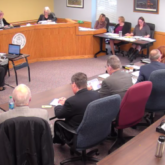
It is now up to Invenergy to prove that a dot on a map in a wetland is sufficient and environmentally acceptable. I don’t see how they can do that and hope that as soon as the Show Cause Hearing is held, the EFSB will require that the water withdrawal plan for Charlestown be removed from Invenergy’s application.

On Tuesday, December 5, the Energy Facility Siting Board (EFSB) held a hearing in Charlestown to hear testimony on Invenergy’s proposal to truck water from Tribal land in Charlestown to Burrillville to cool the turbines of Invenergy’s proposed power plant in the forest of that town. Hundreds of citizens attended the meeting, dozens spoke against the water withdrawal plan, no one spoke in favor of the plan. Many speakers asked questions, but Invenergy provided no answers.
Post includes videos of the speakers.

When: Tuesday, December 5 at 6 p.m. (doors open at 5 p.m.)
Where: Charlestown Elementary School, 363 Carolina Back Road (Rt. 112), Charlestown
What: The purpose of the hearing is to hear your public comment.
Who: This is entirely the Energy Facility Siting Board’s (EFSB) hearing. This is not a Town meeting and the Charlestown government has not been allowed to make a formal presentation. The applicant however gets an opportunity to present to the public and the hearing will begin with a presentation by the applicant Invenergy Thermal Development LLC.
Ideas for questions to ask the EFSB on Tuesday night are at the end of this post.

In denying the Tribal Council’s motion to intervene, the EFSB claimed approval of the motion would put the EFSB in the position of taking a side in internal tribal politics, instead they would just take the contract between Invenergy and “two members of the Tribe”, Matthew Thomas and John Brown, at its “face value”.
Since this November 27 EFSB hearing I have wondered what the EFSB meant by the “face value” of the contract. And what is that face value?
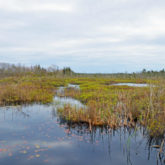
If things weren’t already complicated enough with the proposal by Invenergy to truck water from Tribal land in Charlestown to Burrillville to cool the turbines of Invenergy’s proposed power plant […]
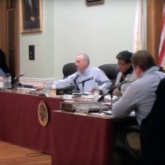
Invenergy declined to amend the contract and set a maximum yearly limit on water withdrawal. Their rationale was that lenders or analysts might see a scenario where they would need more than that maximum and not have confidence in Invenergy’s ability to get cooling water to the plant. The Woonsocket City Council then voted down the water withdrawal contract.

Letter from Ruth Platner: “The Energy Facility Siting Act requires that the EFSB base their decision on a finding that the applicant has shown that there will not be “unacceptable harm to the environment and [that the proposal] will enhance the socio-economic fabric of the state”. With the facts of the water withdrawal hidden from the public, is the EFSB expecting us to just trust their judgment?”

When: Tuesday, November 21 at 7 p.m.
Where: Cross Mills Library (map in post)
What: Invenergy plans to withdraw groundwater from Charlestown and carry it by tanker trucks to Burrillville where it will cool the turbines of the proposed gas and oil fueled power plant. You can learn all about the project that will use this water at this informational meeting.
Who: This event is sponsored by the Rhode Island Association of Conservation Commissions and the Burrillville Land Trust. Burrillville Land Trust President, Paul A. Roselli will lead the presentation and discussion.
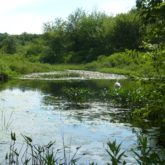
In late September, the tribe contracted with Invenergy to supply water from tribal wells that are sourced from the southern portion of the Lower Wood Aquifer, located in the Wood-Pawcatuck Watershed. The watershed comprises all or parts of Charlestown, Richmond, Hopkinton,Westerly, Exeter, West Greenwich, and South Kingstown in Rhode Island, and North Stonington, Stonington, Voluntown, and Sterling in Connecticut.
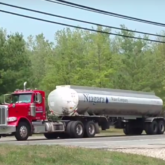
Thanks to residents of Burrillville who shared these two videos of tanker trucks carrying water to an existing power plant in northern Rhode Island.

When: Tuesday, December 5 at 6 p.m. (doors open at 5 p.m.)
Where: Charlestown Elementary School, 363 Carolina Back Road (Rt. 112), Charlestown (map in post)
What: Hearing to allow public comment from Charlestown citizens and others on Invenergy Thermal Development’s proposal to withdraw groundwater from Charlestown and transport it by tanker trucks to Burrillville to cool the turbines of the natural gas and diesel power plant they are seeking to build in the forest in that town.
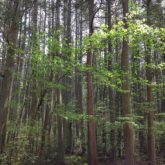
Invenergy now proposes to connect Charlestown and Burrillville with a caravan of tanker trucks carrying water from the Indian Cedar Swamp in Charlestown to cool the turbines of the power plant in Burrillville.

“While Tribal Council members have not received a copy of the purported agreement between Invenergy and the Tribe, generally speaking formal contracts that may be implied or expressly created in this type of agreement require a tribal resolution, signed by the Chief or First Councilman. Such a resolution requires a special tribal meeting and a vote by the body. No tribal meeting or vote has occurred regarding a proposed agreement to sell tribal water to Invenergy.”

On Tuesday, October 17, Charlestown Town Solicitor Peter Ruggiero successfully presented the Town’s motion for intervener status before the Energy Facility Siting Board (EFSB). The EFSB has determined Charlestown is […]
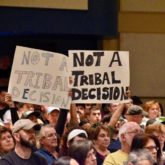
Westerly Sun: “The heavily redacted documents make it impossible to identify where the water will be withdrawn from the Narragansett parcels and what routes will be affected by tanker truck traffic, Platner said in her testimony. The maximum withdrawal quantity is also missing from the documents, making it impossible to gauge the impact on the town and the aquifer, she said.”

Once we get more reliable data, we’ll be able to assess impacts such as safety, noise, air quality, cumulative damage to roads, and energy used. Invenergy will pay for the water, but all these other costs associated with health, safety, and diminished quality of life will be borne by the communities the trucks pass through. And it all depends on how much water is trucked on any given day.
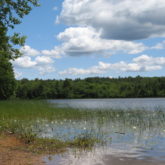
Invenergy recently announced the tribe as the back-up water supplier to cool its proposed plant. However, tribal members claim the water deal was made illegally without a vote from the tribal body, which violates the their constitution. Darlene Monroe, tribal elder and march organizer, said the next step is to file a court order that would put a stop to the water agreement.
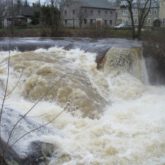
“Charlestown’s interest, therefore, is the potential of a material, adverse impact on Charlestown’s water supply as a consequence of the operation of the proposed Power Plant. To this extent, the Town of Charlestown is an “affected community” … “As such, a public hearing must be conducted in Charlestown, with notice at least 30 days prior, and prior to the final hearing on the Application.”

The Energy Facilities Siting Board should not allow the developers of the Invenergy power plant to use an agreement to withdraw groundwater from within the Town of Charlestown to satisfy any requirement for a backup water supply because of insufficient notice to the Town of Charlestown, insufficient information provided to the Town, and a need for the Siting Board to seek additional legal advice.

Westerly Sun: “You may now become an affected community under the Energy Facility Siting Board’s regulations and if that’s the case they may need to amend the proceeding that they’re in now and have a hearing in Charlestown, but only if we’re allowed to intervene,” Ruggiero said.
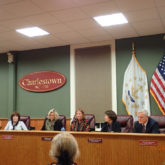
Westerly Sun: “We haven’t been notified, we’ve had no calls from the state agencies, and no calls from the tribe,” council President Virginia Lee said Friday. “We have no information so we’re going to discuss with our lawyers how to go about getting the documents we haven’t been provided and how to get the data.”

This document from Invenergy is so heavily redacted that it is not possible to estimate the impacts of the water withdrawal or possible tanker truck traffic.
There are no maps and no data. It does not identify where the water will be withdrawn in Charlestown except that it is from Narragansett land. The route that the tanker trucks will take is redacted.
The agreement with the Narragansett government is missing in its entirety. It is impossible to know if there is any upper limit on the quantity of water to be withdrawn.

ecoRI News: “John Brown, Narragansett Indian Tribe medicine man, gave ecoRI News a list of reasons for agreeing to work with what could be one of the biggest polluters in the state.”

PROVIDENCE, R.I. — Invenergy has reached agreements with the Narragansett Indian Tribe and Benn Water & Heavy Transport to serve as backup water suppliers to the fossil fuel-burning power plant […]
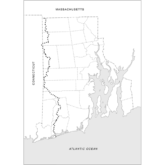
The following letter was submitted to local newspapers and is shared with us here by the author Ruth Platner. Ruth Platner is Chair of the Charlestown Planning Commission. The North […]

At the December 12 meeting of the Town Council, the Council voted unanimously to support Burrillville in their opposition to the 1000 Megawatt gas and diesel power plant proposed in […]